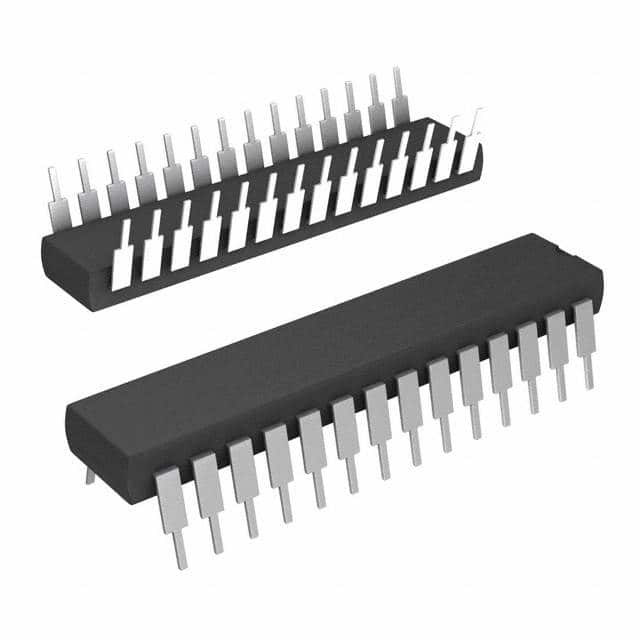MC68HC908MR8CP
Product Overview
- Category: Microcontroller
- Use: Embedded systems, control applications
- Characteristics: Low power consumption, high performance, compact size
- Package: 64-pin LQFP (Low Profile Quad Flat Package)
- Essence: A powerful microcontroller designed for various control applications
- Packaging/Quantity: Available in tape and reel packaging, quantity varies based on supplier
Specifications
- Architecture: 8-bit
- Clock Speed: Up to 8 MHz
- Flash Memory: 8 KB
- RAM: 512 bytes
- I/O Ports: 54
- Timers: 2
- Analog-to-Digital Converter (ADC): 10-bit, 8 channels
- Communication Interfaces: UART, SPI, I2C
- Operating Voltage: 2.7V to 5.5V
- Operating Temperature Range: -40°C to +85°C
Pin Configuration
The MC68HC908MR8CP microcontroller has a total of 64 pins. The pin configuration is as follows:
- VDD - Power supply voltage
- VSS - Ground
- RESET - Reset input
- IRQ - Interrupt request input
- PTA0 - Port A, Pin 0
- PTA1 - Port A, Pin 1
- PTA2 - Port A, Pin 2
- PTA3 - Port A, Pin 3
- PTA4 - Port A, Pin 4
- PTA5 - Port A, Pin 5
- PTA6 - Port A, Pin 6
- PTA7 - Port A, Pin 7
- PTB0 - Port B, Pin 0
- PTB1 - Port B, Pin 1
- PTB2 - Port B, Pin 2
- PTB3 - Port B, Pin 3
- PTB4 - Port B, Pin 4
- PTB5 - Port B, Pin 5
- PTB6 - Port B, Pin 6
- PTB7 - Port B, Pin 7
- PTC0 - Port C, Pin 0
- PTC1 - Port C, Pin 1
- PTC2 - Port C, Pin 2
- PTC3 - Port C, Pin 3
- PTC4 - Port C, Pin 4
- PTC5 - Port C, Pin 5
- PTC6 - Port C, Pin 6
- PTC7 - Port C, Pin 7
- PTD0 - Port D, Pin 0
- PTD1 - Port D, Pin 1
- PTD2 - Port D, Pin 2
- PTD3 - Port D, Pin 3
- PTD4 - Port D, Pin 4
- PTD5 - Port D, Pin 5
- PTD6 - Port D, Pin 6
- PTD7 - Port D, Pin 7
- PTE0 - Port E, Pin 0
- PTE1 - Port E, Pin 1
- PTE2 - Port E, Pin 2
- PTE3 - Port E, Pin 3
- PTE4 - Port E, Pin 4
- PTE5 - Port E, Pin 5
- PTE6 - Port E, Pin 6
- PTE7 - Port E, Pin 7
- AD0 - Analog input 0
- AD1 - Analog input 1
- AD2 - Analog input 2
- AD3 - Analog input 3
- AD4 - Analog input 4
- AD5 - Analog input 5
- AD6 - Analog input 6
- AD7 - Analog input 7
- VREFH - High reference voltage for ADC
- VREFL - Low reference voltage for ADC
- OSC1 - Oscillator input
- OSC2 - Oscillator output
- BKGD - Background debug mode pin
- VPP - Programming voltage supply
- TEST - Test mode pin
- XTAL - Crystal oscillator input
- EXTAL - Crystal oscillator output
- RSTOUT - Reset output
- IRQOUT - Interrupt request output
- VDDA - Analog power supply voltage
Functional Features
- Low power
10个与MC68HC908MR8CP在技术解决方案中的应用相关的常见问题及解答
Sure! Here are 10 common questions and answers related to the application of MC68HC908MR8CP in technical solutions:
Q: What is MC68HC908MR8CP? A: MC68HC908MR8CP is a microcontroller from the HC08 family, designed for embedded systems applications.
Q: What are the key features of MC68HC908MR8CP? A: Some key features include an 8-bit CPU, on-chip flash memory, RAM, timers, analog-to-digital converters, and various communication interfaces.
Q: What are some typical applications of MC68HC908MR8CP? A: MC68HC908MR8CP is commonly used in automotive electronics, industrial control systems, consumer electronics, and other embedded systems.
Q: How much flash memory does MC68HC908MR8CP have? A: MC68HC908MR8CP has 8KB of on-chip flash memory for program storage.
Q: Can I expand the memory of MC68HC908MR8CP? A: No, the memory of MC68HC908MR8CP cannot be expanded externally. However, you can optimize your code to make efficient use of the available memory.
Q: What communication interfaces are supported by MC68HC908MR8CP? A: MC68HC908MR8CP supports serial communication interfaces such as UART (Universal Asynchronous Receiver-Transmitter) and SPI (Serial Peripheral Interface).
Q: How many timers are available in MC68HC908MR8CP? A: MC68HC908MR8CP has two 16-bit timer modules that can be used for various timing and control functions.
Q: Does MC68HC908MR8CP have analog-to-digital converters (ADC)? A: Yes, MC68HC908MR8CP has an on-chip 8-channel 10-bit ADC for converting analog signals into digital values.
Q: Can I program MC68HC908MR8CP in C or assembly language? A: Yes, you can program MC68HC908MR8CP using either C or assembly language, depending on your preference and requirements.
Q: Is MC68HC908MR8CP suitable for low-power applications? A: Yes, MC68HC908MR8CP is designed to operate at low power and has various power-saving features, making it suitable for battery-powered or energy-efficient applications.
Please note that these answers are general and may vary based on specific implementation details and requirements.


